Somehow, some way, for some reason I watched over two hundred films this year. There were stretches where the movie habit was confined to one night a week with Sraëka, and there were months where I was watching two or more a day. In October, looking to confront and make peace with fear, I watched a ton of horror. For my birthday, I marathoned shorts in search of novelty, challenge, inspiration. If I was feeling really crazy, it was time to watch something nuts. When I felt like listening to music, I'd see if there was a concert doc to match that need.
This year's top ten, like last's, is full of shocks, laughs, horror, the extremes of life, fire, challenge, warmth. It's also full of spoilers. If you just want recommendations without context, scroll past the top ten, to see this year's tier list. Everything in the S or A tiers is absolutely worth a watch.
(Note: there are five other movie posts on the blog this year. Three highlighting favourites from January-April, May-August, September-December. Another with all the queer movies I watched in June. And an essay comparing the animal-human relationships in three documentaries: Stuffed, Bestiaire, and Hairat. Many of the titles below are discussed further at the links above.)
Top Ten
10. Will Success Spoil Rock Hunter? (1957)
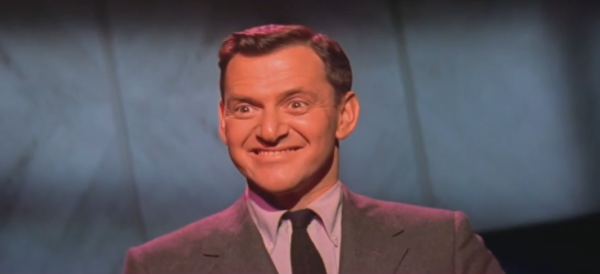
The corruption and dissatisfaction of the climb to corporate success form a thin frame of story, upon which incredible comedic performances, still-fresh jokes, and delightful send-ups of 50s ad culture are piled. It's so funny. This was my first time seeing Jayne Mansfield on screen, and her vocal acrobatics are just amazing.
9. Society (1989)

For a write-up that tries to avoid major spoilers, check here.
Bill Whitney is a sweet high school jock in Beverly Hills, sickened by his incestuous high-society family. He can't talk about it with anyone in his life, and he's been placed under the care of a horrible psychiatrist, so he lives in a conflicted space of denial, disgust, and ironic humour. When his sister's ex-boyfriend shows him a tape of his family speaking candidly about their orgies, conflicts cascade until we reach the summit of mount body horror and directly face the cannibalism of the rich.
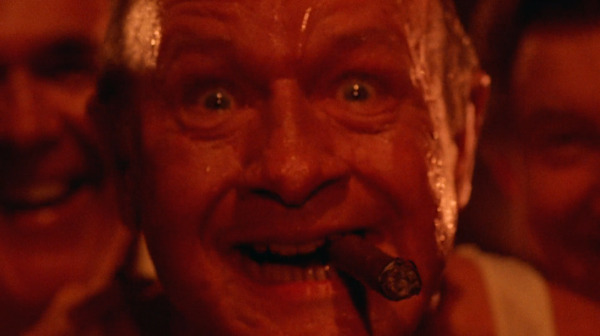
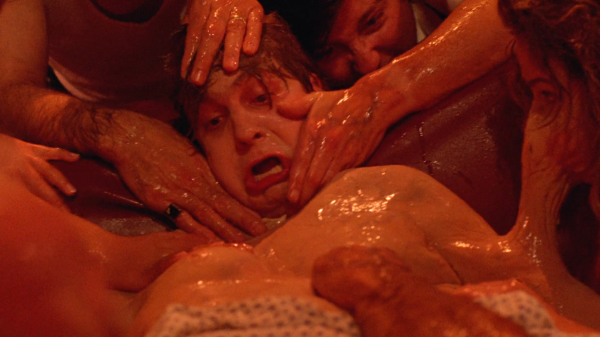
Bill is told, time and again, what a wonderful "contribution to society" he will make, and in the end we see that their meaning is human sacrifice. Society is a sci-fi/fantasy horror with similar politics to They Live, but I find the metaphor here much more compelling. In They Live, the rich are aliens who've taken a human disguise, to run Earth as suits them. Here, the high-society rich are entirely human. At the body horror orgy, while they're violating the bodies of their sacrifices in impossible, melty plasticine ways, merging and consuming and remaking themselves, Bill cries out that they are inhuman. This, they deny. They consider themselves to be the most human, that in fact they are they superior humans, because they victimize other people in this way.
8. Terminal USA (1994)

Writer-director Jon Moritsugu plays two brothers in a Japanese American family: Katsumi, a punk who spends most of the movie suffering with a worsening gunshot wound, and Marvin, a closeted nerd with a secret fetish for skinheads. Their parents and sister seem better fitted to the nostalgic americana which the movie is sending-up-- the cheerleader, the housewife, and a cowboy-hat-wearing businessman. But sex scandals, drug addiction, and millenarian apocalypticism form the fabric of their lives. These could be the pieces of a compelling, conventional melodrama-- but Terminal USA is not that. It's completely insane, hysterically funny, the queerest and punkest thing I watched this year.
7. Tetsuo: The Iron Man (1989)
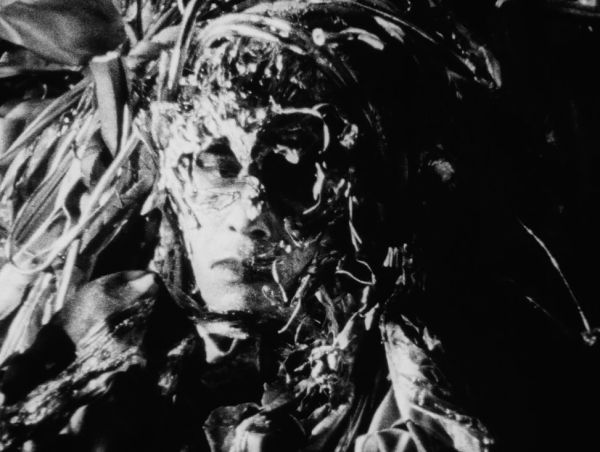
Frenetic, grinding industry. Metal fetishism. A massive tangle of sharp objects and the urge to sink your soft fleshy body into it. To get hit by a car, to throw yourself onto a drill, to be crushed by gears which cannot notice you are there. The fantasy of being made stronger in the process. A perfectly masochistic piece of art. Utterly overwhelming, horifying, delirious. "Industrial metal" at its peak.
6. The Emperor's Naked Army Marches On (1987)
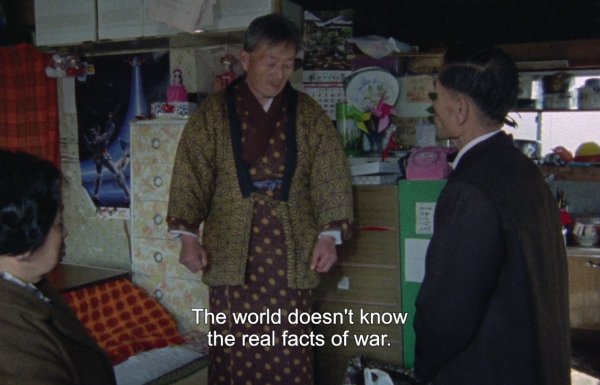
A documentary following Kenzo Okuzaki, an anti-war veteran of the Japanese attack on New Guinea during WW2, as he attempts to organize other vets and convince them to speak honestly and publicly about the realities of war. A special focus is given to the unaccounted-for deaths of two Japanese soliders, whom, as the story unfolds, might have been executed and cannibalized by their commanding officers. Multiple perspectives come through, and we are not given a definitive version of the story, but every survivor has been clearly marked by the imperialist hell they were made part of. Okuzaki, for his part, has devoted his life single-mindedly to making an impact. His passion is incredible to watch, and the scenes where he coaxes stories out of reluctant conservative veterans are some of the most dramatic, tense interactions caught on film.
5. This Is Not a Burial, It's a Resurrection (2019)

A stunning, poetic film which tells a tragic story of land enclosure with a fiery intensity that the fight is not over. Our protagonist is Mantoa, an elderly widow who has lost every one of her family, and whose sole remaining dream in life is to be buried in her ancestral soil. But politicians and industrial developers have zoned her small Mosotho village to be flooded in the construction of a new hydroelectric dam. The villagers will be relocated to a crowded slum, cut off from their means of life and left to fend for themselves on the margins of the urban labour market. Mantoa has nothing to lose, and she puts everything on the line to lead a resistance, for the people to claim the land as their own.
The slightly surreal, mythic quality to the storytelling gives the tale a universal character, which is appropriate, because land enclosure is the global story of billions, over hundreds of years and continuing today. At the same time, the awe-inspiring and loving photography of Lesotho geography grounds the film in a hyper specific, particular space.
The tragedy of the story is not defeatist, nor do I read it as an utter condemnation of industrial development per se. It is instead a harrowing moral reminder of the human cost which cannot be written off or ignored, and a call-to-action for the implementation of better, more democratic approaches and methods of development. It is the story of a type of resistance which has tragically failed, and it implores us to consider what we might do instead.
4. Don't Play Us Cheap (1973)
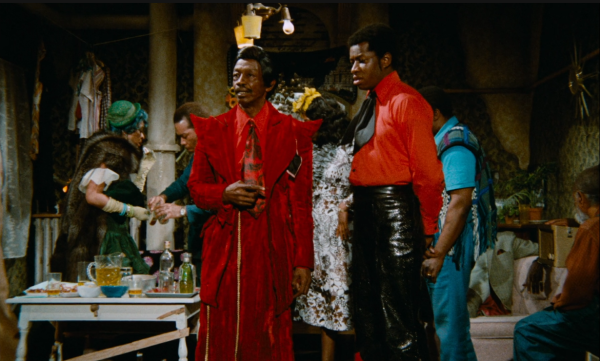
A musical comedy where a couple of demons come to earth, hoping to break up a Saturday night house party in 70s Harlem, for fun. But their every attempt is foiled by the unflappable, resilient, savvy hosts and party-goers. A perfect comedic premise. The younger demon falls in love, the elder has his wickedness subverted and mocked until he doesn't know which way is up. This is a filmed interpretation of a work developed for the stage, using the same sets and actors, and so it highlights an era of Black stage performers which has been under-preserved on film. The show itself is in conversation with common stage tropes for Black characters, but writer-director-composer Melvin van Peebles has given the actors fantastic material and the space to bring a complexity and dignity to these archetypes which I haven't seen matched.
A little more on van Peebles. He was a genius polymath, and this year has been about learning more about him and his work (although the documentary How to Eat Your Watermelon in White Company (And Enjoy It) gave me some ledes I haven't followed up on yet). By the time he made this movie, he'd already had great success on stage and film with two works, Ain't Supposed to Die a Natural Death and Sweet Sweetback's Baadasssss Song, respectively, both released in 1971. While Don't Play Us Cheap shares the radical politics of those works, it's quite different, with an earnest, warm, revolutionary optimism which made it my favourite of his works. But they're all classics deserving of your attention.
3. Cavite (2005)
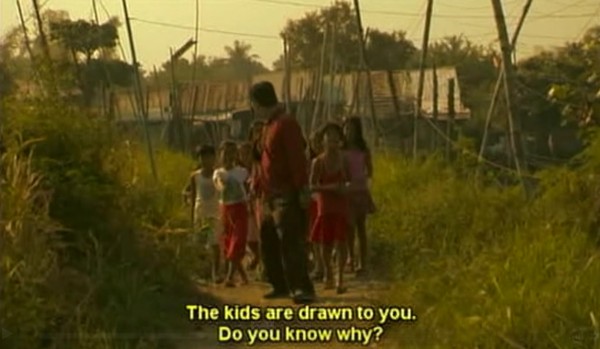
It's unreal, what this no-budget indie manages to do, what two people who put everything they've got into making a movie can do. Aside, perhaps, from my special mention following this list, this is the gutsiest film I watched this year-- maybe in my life. But god, how do I talk about it?
Co-director Ian Gamazon plays Adam, a Filipino American man who travels to his hometown, in the province of Cavite, to bury his father. When he leaves the airport, he receives a phone call: his mother and sister have been kidnapped, and if he wants them to live, he needs to obey the voice on the other end of the line (played by co-director Neill Dela Llana). What follows is a high-stakes thriller where Adam tests his ability to resist the increasingly-dangerous demands, while the voice's provocative taunts force Adam to confront realities that he'd rather forget. And because the film is shot guerrilla-style, on location, and with a deep knowledge of the facts, the viewer really sees the devastating impact of imperialism. American empire is made the clear enemy, and while the group Adam is forced to collaborate with is not presented favorably, the justification for a type of militant resistance is certainly laid out.
2. The Wolfpack (2015)
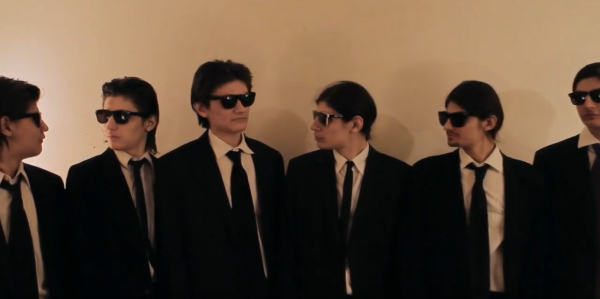
Director Crystal Moselle was walking around Manhattan when she saw a striking sight. The wolfpack: six young men with waist-length hair, matching suits and sunglasses, and similar faces. She introduced herself and they formed a connection. They were the Angulo brothers, then aged 11 to 18, and they loved movies as much as she did. As they got to know each other, Moselle learned more about their incredible story, and by 2015 they'd made this movie together.
For their entire childhoods, the boys were not allowed to leave their apartment. The documentary picks up while they are still in the middle of processing a newly earned freedom-- still living at home with their parents, but allowed to come and go as they please. The change came after then-fifteen-year-old Mukunda sneaked out of the apartment in an unforeseen act of defiance. In the aftermath, Mukunda received psychological help and was connected to a support network outside of the home. After that, some freedom opens up for the family. By the time of filming, Mukunda does not speak to his father at all, and the father haunts both the home and the film, quietly resigned to his loss of power over the family. It's a family dynamic I remember well from my teen years, and I've never seen it so clearly portrayed. I think Moselle did a perfect job drawing out the brilliance and humour and humanity of these brothers, and the film holds the most difficult parts of their lives with a great sensitivity which I worry my words have betrayed.
When the father finally speaks to camera, it's the kind of half-baked excuses and non-apologies you'd expect. Their mother is so familiar to me that I'm moved to tears with love for her just at the memory of watching. I hope that she and all of her children are healthy, fulfilled and free today.

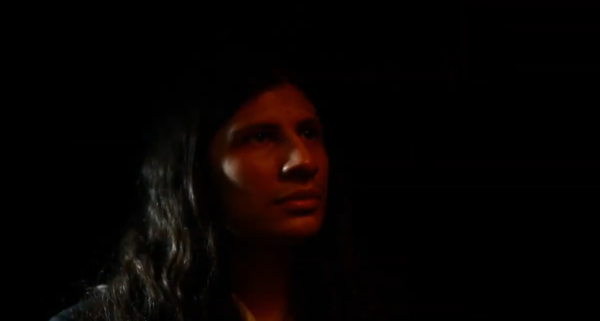
The wolfpack's love of film is key. Watching and re-enacting movies together was the essential way that the brothers coped with and made meaning of their lives-- and this active engagement with the art form, really studying it and making their own productions together, has clearly made a positive impact in their lives. They know how to work together, think through ideas that are counter to the ones they were raised with, and make their lives anew. Envisioning himself as Michael Myers was how Mukunda got the nerve to make his first escape (boy how my teenage self relates to this...). And the movie closes with a short film which Mukunda directs, an art film, with his family members cast and costumed-- including his father. I worked on a short film as a teenager, which I never got close to finishing, which cast my father and scared the hell out of me. And through to now, even though I don't have to live with the man anymore, art is still a major way I manage to make sense of and cope with all that.
1. Bacurau (2019)
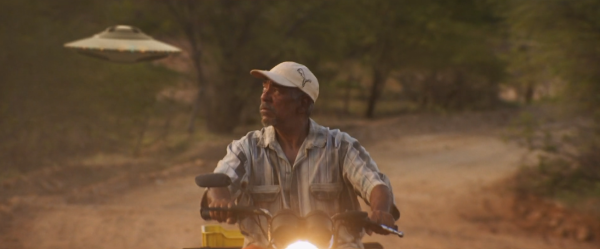
In this post, I tried to talk about Bacurau without too many spoilers. Because frankly, I think you're best off going into it that way, and I want everyone to watch this movie ASAP. Preferably with at least one other person, so you can react and shout and cheer and gasp together. Let's just say it's an thrilling, disturbing, outstanding genre film about organized resistance...
Assuming now that you've gone and seen the movie, let's talk.
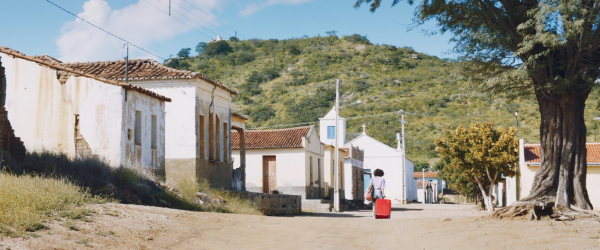
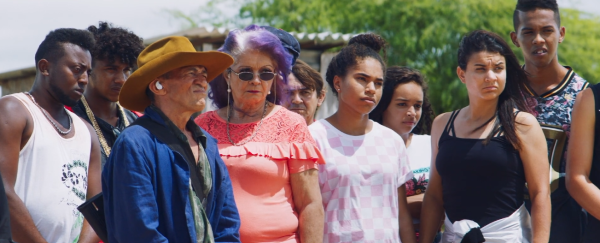
Bacurau combines slasher, action, and western, and it gets really, seriously grizzly. The film is at its most gentle at the start, which is a funeral for the elderly Afro-Brazilian matriarch of the fictional Brazilian small town of Bacurau. After her passing, strange things start to happen. While teaching a class, the town's schoolteacher notices that Bacurau is no longer marked on google maps. Later, a farmer spies a UFO-shaped drone. Something bad is happening, and we do not find out the cause until an hour in, after we've grown to love the community, which is composed of an immense cast of characters, at least fifty speaking roles, diverse and distinct individuals with full personalities.
Their town has been betrayed by a narcissistic "local" politician who only shows up to make pathetic attempts to impress them with big shows of gifts, most of which are useless trash. There is a great scene, after the politician has dumped off his "aid", where the town doctor speaks to the gathered community and teaches them about the pile of narcotics they were left, and about what their medical needs really are. In another scene, we see a crowd gathered around, cheering while a local DJ plays his WorldStarHipHop-style compilation of the baddest assassinations carried out by an affiliated urban guerrilla group.
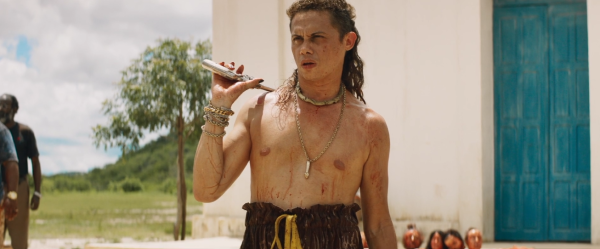
In ways like this, the film takes care to show exactly how this town keeps their political consciousness-- education, humour, organizing to meet their own needs, and as we ultimately find out, a long history of militant self-defense. Throughout the film, we are shown glimpses of the town museum. When a couple suspicious strangers from São Paulo pass through, they're told that they should really check out the town's musem before they leave. They don't, and we don't get inside the museum until the midst of the climax. After the climax (which is a spectacular battle against a USAmerican fascist death squad), they're hosing blood off the museum floor.
It's an uncompromising, unsubtle, clear-sighted tour de force.
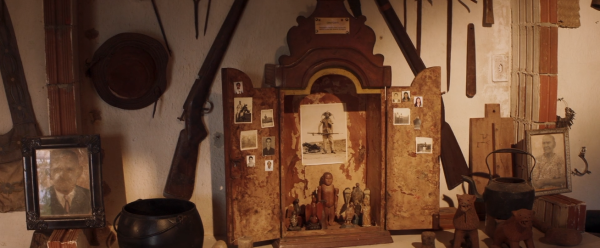
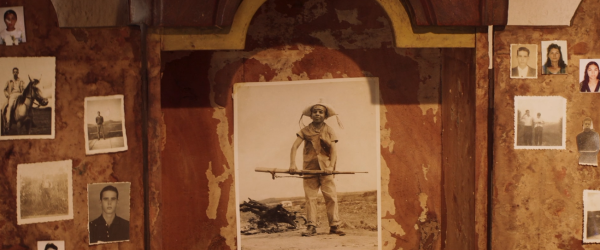
Special mention: 5 Broken Cameras (2011)

A great documentary, but its meta approach got me more interested in the circumstances of its creation than in what we actually see on screen. Director Emad Burnat bought his first camera to film the birth of his son, but Israeli settler projects in his West Bank village, Bil'in, thrust him into the role of citizen-journalist. We follow a series of his cameras as they're broken by Israeli soliders who didn't want their violence to be documented. Most of the documentary footage comes from those five cameras, although additional coverage comes from some of Burnat's allies (such as co-director, Guy Davidi, who joined the project four years in).
It feels like the intended audience for this film are people who are already pretty well-informed and who live with the realities, or even just the myths, of the zionist project. Meaning that this is not really a piece of political education, but an excellent journalistic documentary of a village in resistance. That said, I was a little too ignorant to understand a lot of the specific references being made.
Because the film is inherently and uncompromisingly Palestinian, it offended and enraged some people. That didn't surprise me in the least. What did surprise me was that it won Best Documentary at the Jerusalem Film Festival, was nominated for Best Documentary at the Ophir Awards, and recieved funding in part by Israeli sources (eg. Israel's Channel 8, and the New Israeli Cinema Fund). Some people have even tried to claim it as an Israeli movie, in light of its international critical success. I was surprised to see some of the title cards in the credits, because I tend to assume that everyone in Israel must be like the most far-right zionists here in the west. But while settler-colonial violence and exploitation are the basis for Israel's existence, they are a fact of daily life, and the culture is saturated with the kind of terrible, violent, racist logics you'd expect, solidarity with Palestinians (or maybe more like lip-service...) seems to be a mainstream left position there. Maybe this is all from Palestinians who live and work in Israel, and doubtless it is an effect of Palestinian resistance. Maybe it's not too different from the way anti-racism and anti-colonialism exist here in north america-- life-or-death struggles which many settler liberals and leftists say they're sympathetic to, but rarely actually join or act in radical solidarity with. In any case, I still have a lot to learn and unlearn.
Notes on my few re-watches this year:
Rewatches which made me like a movie less:
- Halloween (1978), which is still good but just less scary the fourth time.
- Pacific Rim (2013), which I can't believe I enjoyed at the time of its release.
Rewatches where nothing much was gained or lost:
- Some Like it Hot (1959), classic.
- The Band Wagon (1953), fine.
- Double Indemnity (1944), fine.
- Point Break (1991), still great.
- PlayTime (1967), my first watch was on the big screen, and something is lost watching it on TV, but then something is gained in a rewatch.
- A Charlie Brown Christmas (1965), classic.
- Rudolph the Red-Nosed Reindeer (1964), still weird.
- Jingle All the Way (1996), a guilty pleasure.
Rewatches that improved the movie for me:
- The Fifth Element (1997), relieved that it's even more fun than when I watched as a teen.
- Dracula (1931), I love Lugosi more every time.
- F for Fake (1975), paired well with beer and bbq.
Weirdest rewatch experience:
- Ichi the Killer (2001), which was less fun, much more disturbing, and just plain stranger than when I watched it as an edgy teen.
Tier List for All New Watches
(S) Contentender for Top Ten
- The Annihilation of Fish (1999)
- Don't Play Us Cheap (1973)
- "Close-Up" Long Shot (1995) (short)
- Ornette: Made in America (1985)
- Always for Pleasure (1978)
- Bright Future (2002)
- Cavite (2005)
- The Emperor's Naked Army Marches On (1987)
- Will Success Spoil Rock Hunter? (1957)
- my favorite software is being here (2021) (short)
- Asparagus (1979) (short)
- Arrebato (1979)
- Terminal USA (1994)
- Delphine's Prayers (2021)
- Bamako (2006)
- Bacurau (2019)
- Better Luck Tomorrow (2002)
- Memories of Underdevelopment (1969)
- This Is Not a Burial, It's a Resurrection (2019)
- The Wolfpack (2015)
- Bontoc Eulogy (1995)
- 5 Broken Cameras (2011)
- Vampire's Kiss (1988)
- Relaxer (2018)
- The Slumber Party Massacre (1982)
- Tetsuo: The Iron Man (1989)
- The Last Temptation of Christ (1988)
- Society (1989)
- Sun Ra: A Joyful Noise (1980)
- The 36th Chamber of Shaolin (1978)
- Ghostwatch (1992)
- It's a Wonderful Life (1946)
(A) Brilliant, loved it
- Sweet Sweetback's Baadasssss Song (1971)
- Faya Dayi (2021)
- Hairat (2017) (short)
- Jason and Shirley (2015)
- Which Way Is East? (1994) (short)
- Incoherence (1994) (short) (restoration 2019 Korean Film Archive)
- Shake! Otis at Monterey (1968) (short)
- Hot Pepper (1973)
- Tampopo (1985)
- Mon Oncle (1958)
- Ask Father (1919) (short)
- Creepy (2016)
- Please Vote for Me (2007)
- The Plumber (1979)
- Loose Corner (1986) (short)
- Reckless Eyeballing (2004) (short)
- All Screwed Up (1974)
- Fresh Kill (1994)
- Gash / Lace (2014) (short)
- Decussation Chamber (2015) (short)
- Magnetic Resonance (2015) (short)
- Bring Down the Walls (2020)
- Gerontophilia (2013)
- The Bitter Tears of Petra von Kant (1972)
- Chez Jolie Coiffure (2018)
- The Two Faces of a Bamiléké Woman (2018)
- Babylon (1980)
- Microhabitat (2017)
- Sweet Country (2017)
- Chan is Missing (1981)
- Boom for Real: The Late Teenage Years of Jean-Michel Basquiat (2017)
- Walker (1987)
- Buzzard (2014)
- Lord Shango (1975)
- White of the Eye (1987)
- Dogora (1964)
- The Blob (1988)
- The Hidden (1987)
- Taste of Cherry (1997)
- Topkapi (1965)
- Phantom of the Paradise (1974)
- Pumping Iron (1977)
- Snake Eyes (1998)
(B) Great movie
- Teknolust (2002)
- Edward II (1991)
- Losing Ground (1982)
- They Live (1988)
- Geometria (1987) (short) (restored for criterion's Cronos release)
- Da Yie (2019) (short)
- Trances (1981)
- Red Desert (1964)
- N.U. (1948) (short)
- The Upsetter: The Life and Music of Lee "Scratch" Perry (2008)
- The Blues Accordin' to Lightnin' Hopkins (1968) (short)
- Spend it All (1971) (short)
- Sprout Wings and Fly (1983) (short)
- In Heaven There Is No Beer? (1984) (short)
- Parade (1974)
- Syndromes and a Century (2006)
- Wattstax (1973)
- Cure (1997)
- American Boy: A Profile of Steven Prince (1978)
- Original Cast Album: Company (1970)
- The Traveler (1974)
- Stormy Weather (1943)
- Sangam (2004) (short)
- Mobile Suit Gundam: Char's Counterattack (1988)
- No Maps on My Taps (1979)
- Toby Dammit (1968) (short) (2019 restoration)
- Eddie, Pam, Gary, Sue (2007) (short)
- The Watermelon Woman (1997)
- How to Eat Your Watermelon in White Company (And Enjoy It) (2005)
- Rockers (1978)
- Reluctantly Queer (2016) (short)
- Beetle Queen Conquers Tokyo (2009)
- Hollywood Chinese (2007)
- Fire Music (2021)
- Punching at the Sun (2006)
- Ape (2012)
- Rodan (1956)
- Matango (1963)
- Jigoku (1960)
- Isle of the Dead (1945)
- He Who Dances on Wood (2016) (short)
- The Lair of the White Worm (1988)
- Road Games (1981)
- Prince of Darkness (1987)
- if.... (1968)
- Even Cowgirls Get the Blues (1993)
- Dressed to Kill (1980)
(C) Interesting or entertaining
- Finding Frances (2017)
- Portrait of Jason (1967)
- The Taking of Pelham One Two Three (1974)
- Watermelon Man (1970)
- Sign O' The Times (1987)
- Cronos (1993)
- Self Divination (1989) (short)
- Mutual Native Duplex (1990) (short)
- The Nomadics (1991) (short)
- Disintegration 93-96 (2017) (short)
- Distancing (2019) (short)
- Kings of Pastry (2009)
- Jubilee (1978)
- A Walk With Kiarostami (2003) (short)
- Gente del Po (1947) (short)
- Diary of a Mad Black Woman (2005)
- Garlic is as Good as Ten Mothers (1980) (short)
- Jackie Chan: My Stunts (1999)
- Monsieur Hulot's Holiday (1953)
- Jour de Fête (1949) (1964 version)
- Deadly Weapons (1974)
- School for Postmen (1947)
- Blood and Black Lace (1964)
- Take a Chance (1918) (short)
- Bumping into Broadway (1919) (short)
- Murders in the Zoo (1933)
- A Demonstration (2020) (short)
- Two Sons and a River of Blood (2021) (short)
- It's Always Fair Weather (1955)
- Never Weaken (1921) (short)
- His Motorbike, Her Island (1986)
- About Tap (1985) (short)
- Deep Blues (1992)
- Bolex Study #1 (2010) (short)
- Gold Moon, Sharp Arrow (2012) (short)
- Woven Knots (2013) (short)
- Song For Rent, After Jack Smith (2019) (short)
- Gossamer Walls (2007) (short)
- ...But Then, She's Betty Carter (1980)
- Stud Life (2012)
- Shaolin Soccer (2001)
- Inland Empire (2006)
- The Harder They Come (1972)
- Bad Girls Go To Hell (1965)
- Ingrid Caven: Music and Voice (2012)
- Valley Girl (1983)
- Constantine (2005)
- The Trained Chinese Tongue (1994) (short)
- A Poem is a Naked Person (1974)
- Streetwise (1984)
- And the Whole Sky Fit in the Dead Cow's Eye (2016) (short)
- Acting Our Age (1992) (short)
- I'm British But... (1989) (short)
- A Nice Arrangement (1990) (short)
- What Do You Call an Indian Woman Who's Funny? (1994) (short)
- The Alchemist Cookbook (2016)
- Surname Viet Given Name Nam (1989)
- Dracula (Spanish-language version) (1931) (dir. George Melford)
- still/here (2000)
- Heroin (2017) (short)
- Wolfen (1981)
- The Black Cat (1934)
- The Funhouse (1981)
- Fascination (1979)
- Basket Case (1982)
- Rising Tones Cross (1985)
- Body Double (1984)
- Love on a Leash (2011)
- Raising Cain (1992)
- 12 Pups of Christmas (2019)
- Christine (1983)
(D) Fair to poor
- Dead Poets Society (1989)
- To The Unknown (2017) (short)
- Miss Dundee and her Performing Dogs (1902) (short) (2017 Film Preservation Associates edition)
- White Echo (2019) (short)
- Boo! A Madea Halloween (2016)
- Monterey Pop (1968)
- Gai Dimanche (1935) (short)
- Supermarket Woman / Sûpâ no onna (1996)
- The Marathon (1919) (short)
- The Rules of the Game (1939)
- Million Dollar Legs (1932)
- Murder at the Vanities (1934)
- His Royal Slyness (1920) (short)
- International House (1933)
- Cab Calloway's Hi-De-Ho (1934) (short)
- The Gospel of Eureka (2018)
- Kung Fu Hustle (2004)
- Just Don't Think I'll Scream (2019)
- Silver Streak (1976)
- Quill: The Life of a Guide Dog (2004)
- Thing from the Factory by the Field (2022) (short)
- Brain Damage (1988)
- The House by the Cemetery (1981)
- I Was a Teenage Zombie (1987)
- A Christmas Prince: The Royal Wedding (2018)
- Babes in Toyland (1986)
- Time and Judgement (1988)
- Wombling Free (1977)
- Cats (2019)